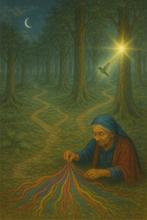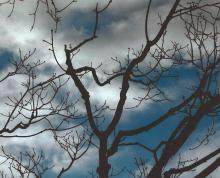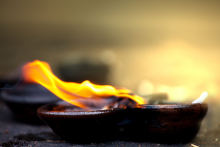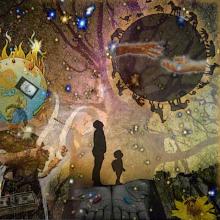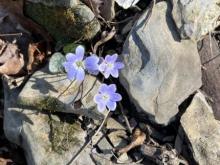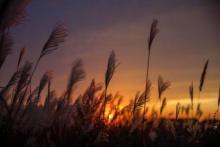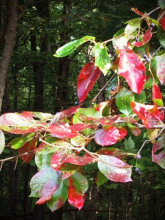Every summer for years my husband and I have gone to the twin islands of Chincoteague and Assateague off the Virginia coast. Chincoteague is tiny, tucked behind the much larger barrier island of Assateague, which is home to a wildlife refuge and the famous wild ponies. The first seven days of our retreat this year saw plenty of wildlife of the grandchild kind: six of ours, plus one: two teenagers, one 8-year-old, and a 3, two 2s, and an 8-month-old.
By the river it is cool and gray at last after a night of longed-for rain, however intermittent. Mist this morning clung to the trees, but it is gone now, leaving the caress of quiet moist air. The river is low, the banks brown, rock outcroppings breaking the water; but yet it flows, an ancient witness; as is the moss, growing up the north side of the oaks and box elders and sycamores, whose branches, sparse with brown and yellow leaves, form a wild weave against the pewter sky. A heron, guardian of edges, rises from the mud and glides in a wide arc to other shore.
“Season” might actually be a verb. Here near the banks of the Potomac as it wends its way between Maryland and West Virginia, the trees put forth bright pinpricks of color on filagree branches; green shoots dance upward amid clumps of dried grass; sunlight sharpens and dances on the water; finches flit and vibrate yellowly; ephemeral pools sing at night. All this activity is happening without any human will, effort, or manufacture. A verb has no heft or edges or boundaries, no definitions, nothing to grab. I do not know when spring began springing nor when it will cross into summering.
Not too many days ago, on February 1, we celebrated St. Brigid’s Feast Day, which occurs on the ancient festival of Imbolc, the cross-quarter day halfway between Solstice and Equinox.
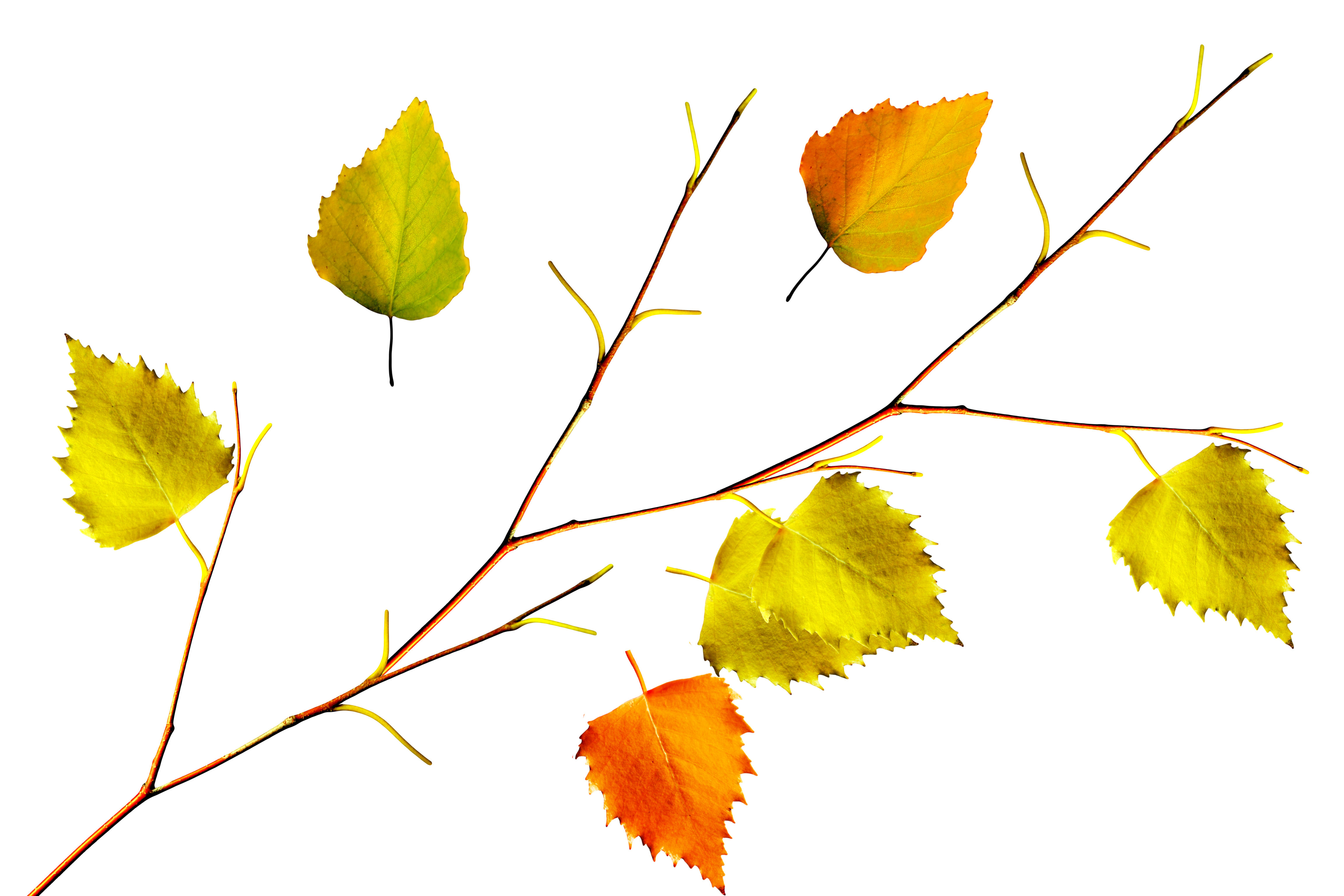
We hope you are nourished by Nan's words, and the words of the others whose quotes have been gathered for you in this Letter and in the Letters that have come to you each month, without fail, for 36 years.
This summer the haze from the wildfires in Canada descended where I live, turning the oaks and box elders at the far end of the farmer’s field into gray-green ghosts. Our corner of West Virginia rarely experiences such tentacles of climate change, but during these days of the hottest global temperatures on record we have had an acrid taste of what much of the rest of the planet undergoes all the time. We were enveloped by the murk that is everywhere, that cannot be evaporated, captured, or sent away, no matter how intensely, how fervently we try; no matter how urgently we cry out to science
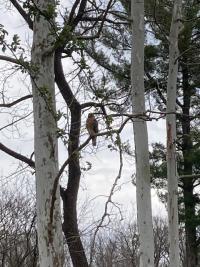 The news flickering daily on our incessant screens is nearly always heartbreaking, but last week’s report from the Intergovernmental Panel on Climate Change (IPCC) was particularly excruciating because it concerned everyone and everything we love. The IPCC found that Earth will cross a critical threshold for global warming within the next decade. The continued use of fossil fuels is dooming any possibility of slowing the warming of the planet. The panel pleaded with industrialized nations to join together immediately to slash greenhouse gases roughly in half by 2030 and to stop adding carbon dioxide to the atmosphere altogether by the early 2050s. If both these actions happened, said the panel, the Earth and her inhabitants would stand half a chance.
The news flickering daily on our incessant screens is nearly always heartbreaking, but last week’s report from the Intergovernmental Panel on Climate Change (IPCC) was particularly excruciating because it concerned everyone and everything we love. The IPCC found that Earth will cross a critical threshold for global warming within the next decade. The continued use of fossil fuels is dooming any possibility of slowing the warming of the planet. The panel pleaded with industrialized nations to join together immediately to slash greenhouse gases roughly in half by 2030 and to stop adding carbon dioxide to the atmosphere altogether by the early 2050s. If both these actions happened, said the panel, the Earth and her inhabitants would stand half a chance.
A small group of friends in the cohousing community where I moved almost two years ago have been meeting regularly to deepen relationship with one another. We try to practice authenticity and help each other navigate around the eddies and whirlpools of life in intentional human community and through the shoals of this chapter of Earth’s story. Not long ago we watched a video of the storyteller Martin Shaw relating an old and powerful tale, “The Handless Maiden”. The invitation was to allow the story to sit beside us for a while and perhaps, if it seemed right, to relay to one another what happened. What emerged for me seeded this reflection.*
It’s the season of waiting, a thin time. The shadows along the river in the afternoon are long. The coral sun, tinged with gold, slants between the trunks of the sycamores and poplars.
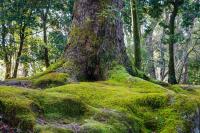 In early June I helped to lead a women’s retreat at Rolling Ridge. About a week before the retreat, we each received a suggested assignment to reflect on the experience of the past two years, the strange time between the pre-pandemic world we thought we knew and whatever might be ahead. “What have you learned in this interim? what has been revealed? what might you want to remember and carry into whatever is next? what is best left behind?” This was my reflection:
In early June I helped to lead a women’s retreat at Rolling Ridge. About a week before the retreat, we each received a suggested assignment to reflect on the experience of the past two years, the strange time between the pre-pandemic world we thought we knew and whatever might be ahead. “What have you learned in this interim? what has been revealed? what might you want to remember and carry into whatever is next? what is best left behind?” This was my reflection:
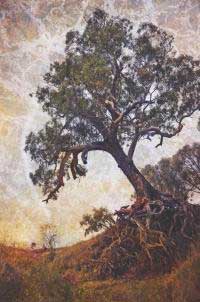
Early in the new year some friends, who for a long time in the pre-pandemic world had met and worked together on leading retreats that touched on “nature and soul”, gathered on Zoom to contemplate a return to this work. The following reflection is based on what I shared as we began our meeting.
“Now let us welcome the new year, full of things that have never been.” This quote by Rainer Maria Rilke, with its echoes of wonder and unbridled anticipation, is appreciated by many of us. I have always liked it; though my enthusiasm for the expressed sentiment is curious, because the imperative to welcome all things is a fierce one. Rilke is also the poet who wrote, “Let everything happen to you; beauty and terror.”
It's been six months since my husband and I moved the last box from our home at Rolling Ridge to our place in the cohousing community we have been part of visioning, building, and weaving together for more than a decade. Now when I look out the window over my desk I see a narrow band of oaks, firs, and maples ringing cottages clustered in twos and threes with small yards overflowing with all manner of native and medicinal plants. The sky overhead is wide and wild. The field to the south stretches to the horizon, just beyond the community's meticulously tended permaculture garden. On the north, the cottages form a gentle "U" looking toward the Common House, the central hearth and shared home of our community.
In spring, as friends met under freshly greening branches, we thought of a retreat at Rolling Ridge, “Returning to Holy Ground.” We dared to imagine a group gathered once again within the Meditation Shelter for ceremony and council, camping in the early autumn woods, and lodging for two nights in the shared cabin where simple meals might be prepared and eaten together. We thought of beautiful questions that might arise from a time of pandemic during which many were apprenticed to loss, sorrow, uncertainty, and perhaps to unexpected angels. What has been true for us? What have we learned? And what, now, do we hold in our open hands?
A season of dappled light followed, drenched in the sun’s bright rays. Around my home in Shepherd Village a landscape of wildish native plants blossomed: delicate pink milkweed, bright suns of coreopsis, bold coneflowers, spikes of lavender beardtongue, vibrant blue delphiniums in a riot of happy color.
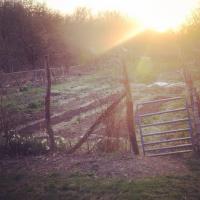 More than a year ago, last April, a few of us began taking a silent walk at sunset around the field and garden at Rolling Ridge. We walked past the clusters of daffodils, the trees with bare branches dusted pale green, the quiet garden. We wanted somehow to be present to the precarious, uncertain circumstances since a pandemic had rolled across the planet and we fell out of the world we had known. I remember resonating with Lynn Unger’s poem “Pandemic”, which called on us to consider the invitation to slow and cease:
More than a year ago, last April, a few of us began taking a silent walk at sunset around the field and garden at Rolling Ridge. We walked past the clusters of daffodils, the trees with bare branches dusted pale green, the quiet garden. We wanted somehow to be present to the precarious, uncertain circumstances since a pandemic had rolled across the planet and we fell out of the world we had known. I remember resonating with Lynn Unger’s poem “Pandemic”, which called on us to consider the invitation to slow and cease:
And when your body has become still,
reach out with your heart.
Know that we are connected
in ways that are terrifying and beautiful.
.jpg) As February slid toward March, the harsh grip of winter tightened. It snowed, and snowed some more. Fierce winds thrashed the oak and fir trees around my new home, a cohousing village community built not long ago on the edge of an old and vibrant small town. To the south of the circular cluster of duplex and triplex homes that make up the community there is a field where cows graze when the snow melts. On the east we have a tiny forest preserve lovingly salvaged from the construction perimeter. This is where I sometimes take a slow walk. I am barely beginning to know this place.
As February slid toward March, the harsh grip of winter tightened. It snowed, and snowed some more. Fierce winds thrashed the oak and fir trees around my new home, a cohousing village community built not long ago on the edge of an old and vibrant small town. To the south of the circular cluster of duplex and triplex homes that make up the community there is a field where cows graze when the snow melts. On the east we have a tiny forest preserve lovingly salvaged from the construction perimeter. This is where I sometimes take a slow walk. I am barely beginning to know this place.
Not far from here is the mountain whose familiar trails, contours, and inhabitants I have cherished. Rolling Ridge is where I lived, closely with friends, for many years; and where now, I visit.
Ah, Grief, I should not treat you
I pin my hopes to quiet processes and small circles,
in which vital and transforming events take place.
~ Rufus Jones, quoted by Parker Palmer in A Hidden Wholeness, The Journey Toward an Undivided Life
The delicate oval leaf lay on the trail, small and bright. Tupelo trees are beforehand in the journey toward autumn, releasing their chlorophyll sometimes in mid-August, and always when the rest of the forest is still deep with green. Long before fall is in the air, the scarlet teardrops scatter here and there on the forest floor, tiny beacons of the season to come.
 It was hot, a rainless time. The stick weed and wine berries wilted among the straw grasses. The creek beds were scatterings of tumbled stones. In the garden, Kate watered, and watered again. The hard soil seemed to repel the moisture. Several times a day the forest reverberated with the sound of a tree branch cracking and falling. Everything was brittle.
It was hot, a rainless time. The stick weed and wine berries wilted among the straw grasses. The creek beds were scatterings of tumbled stones. In the garden, Kate watered, and watered again. The hard soil seemed to repel the moisture. Several times a day the forest reverberated with the sound of a tree branch cracking and falling. Everything was brittle.
Grief in a Time of Not Knowing. The podcast’s title had me at hello. It turned out to be an interview with Zen Buddhist teacher and author Joan Halifax. The discussion opened by considering whether living in these times means to be engulfed in a collective initiation. Roshi Joan noted that a classic initiatory experience begins with separation and moves through a threshold phase before reaching the time of return. She pointed to the separations of our time: the quarantine and social distance caused by the alien coronavirus as well as the hurtful chasms we have carved for ourselves through hundreds of years of history.
.jpg)
On the Schoolhouse Trail I passed an old tree with a craggy opening near the forest floor, an intriguing portal to the Underworld. Meanwhile, the serviceberries are out, their delicate creamy blossoms like fallen stars in the woods. Serviceberries are so named because they bloom at the time when the ground softens after the winter freeze thus readying the earth for burials and making services of parting and remembrance possible. Gray fog is wrapping itself around the high, still bare branches, shrouding the tree tops. So much is about fog and loss and descent. Collectively we have fallen out of a world we thought—even worried—was immutable. Mystery cloaks what comes next, what the eyes of the future see. What do we do now?
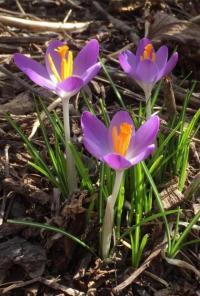 The vernal equinox is a handful of days away, announcing the astronomical beginning of spring. On a morning last week, as dawn chased the darkness from the forest's edge, the moon was a glowing, golden plate resting on the western horizon. Tiny purple crocuses peeked up through pale brown grasses. Bright daffodils nodded on slender stems. Lacy green fronds adorned the old willow stump. On the edge of winter and spring, the moon, stars, and sun grandly and reliably spun a new day. The land offered delicate, deliberate promise of renewal and returning life.
The vernal equinox is a handful of days away, announcing the astronomical beginning of spring. On a morning last week, as dawn chased the darkness from the forest's edge, the moon was a glowing, golden plate resting on the western horizon. Tiny purple crocuses peeked up through pale brown grasses. Bright daffodils nodded on slender stems. Lacy green fronds adorned the old willow stump. On the edge of winter and spring, the moon, stars, and sun grandly and reliably spun a new day. The land offered delicate, deliberate promise of renewal and returning life.
But we know that around and just beyond this idyll, a maelstrom whirls at speed, carrying all manner of things ill and fearful. The virus raging through global humanity is a visceral, microbial emblem of a planet and a world profoundly undone.
